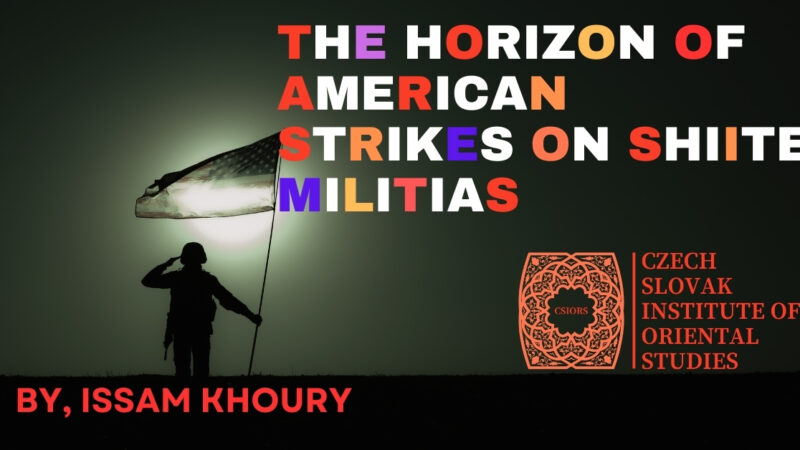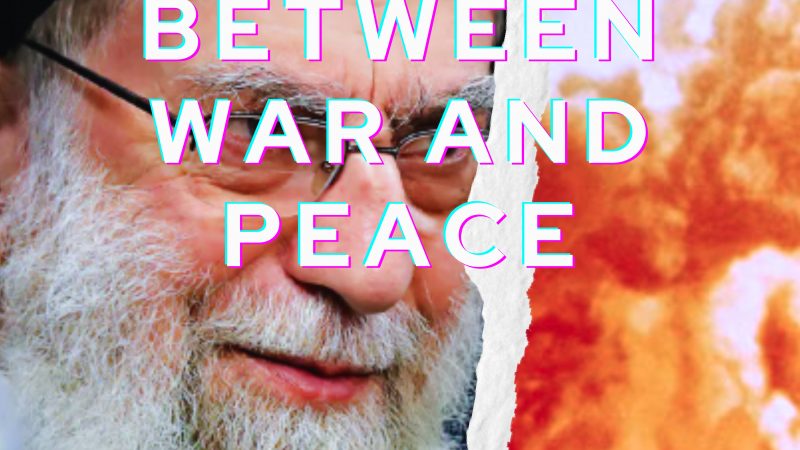Syrians- Americans hosted by the SDC
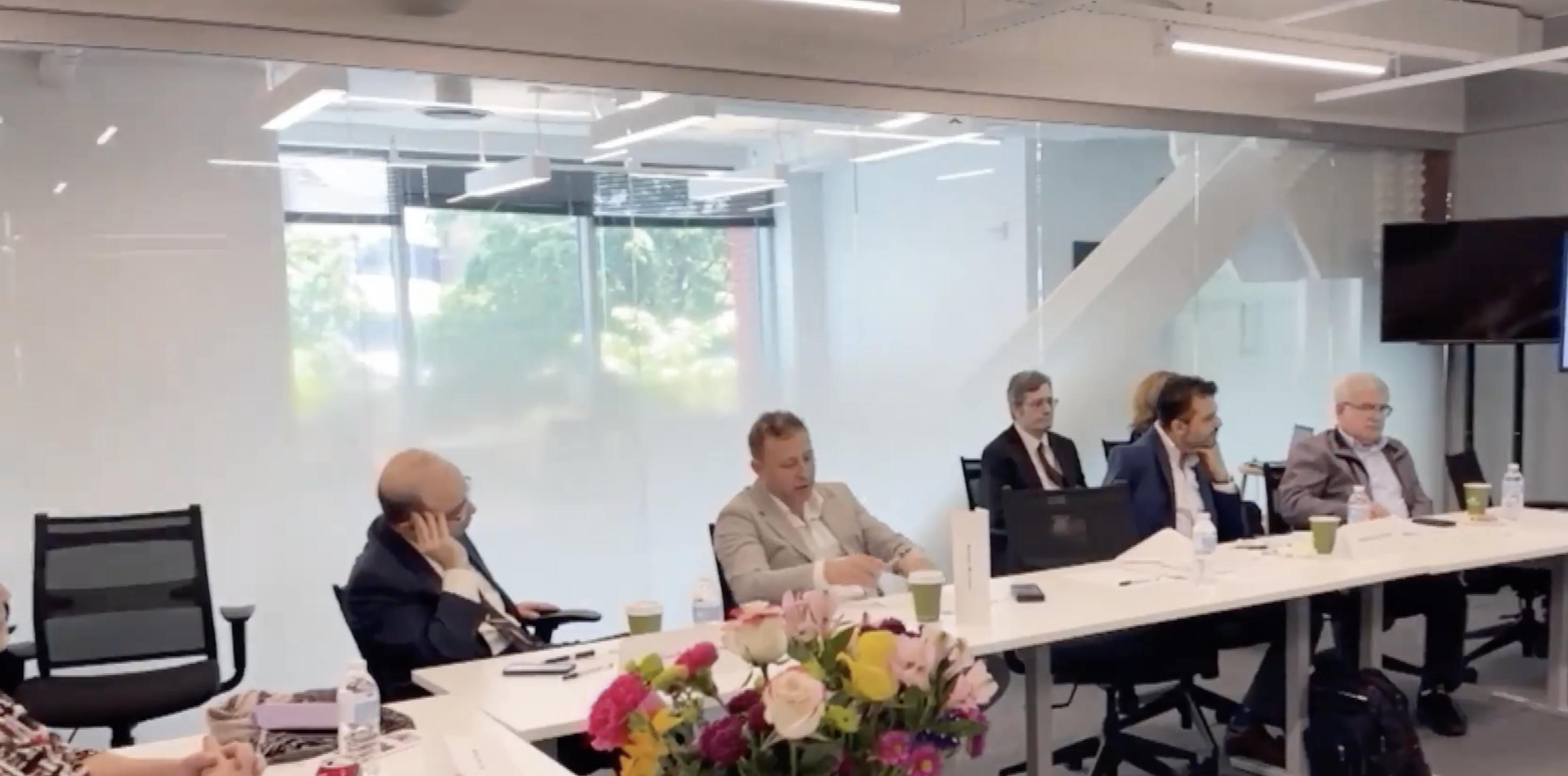
Czech-Slovak Institute of Oriental Studies & CESD
May 12, 2023
The Syrian regime reinforced the state of sectarian and national division in Syria, which resulted in a deep social and political rift in Syrian society.
These differences were tamed after the outbreak of the Syrian revolution by the Syrian groups benefiting religiously and nationally, through their cooperation with regional and international powers, to create Syrian ideologically[1], nationally, and sectarianly[2] conflicting cantons. Unfortunately, this conflict was not confined to the Syrian land but rather extended to the nonprofit organizations that were established by Syrian opponents in the countries of exile.
Many nonprofit organizations that support services, humanity, and rights for the Syrian people have defined their activities as serving a specific area such as (the As-Suwayda region, the Autonomous Administration region of northeastern Syria, the northwestern region “Of Idlib and its countryside”, the region of the Syrian regime).
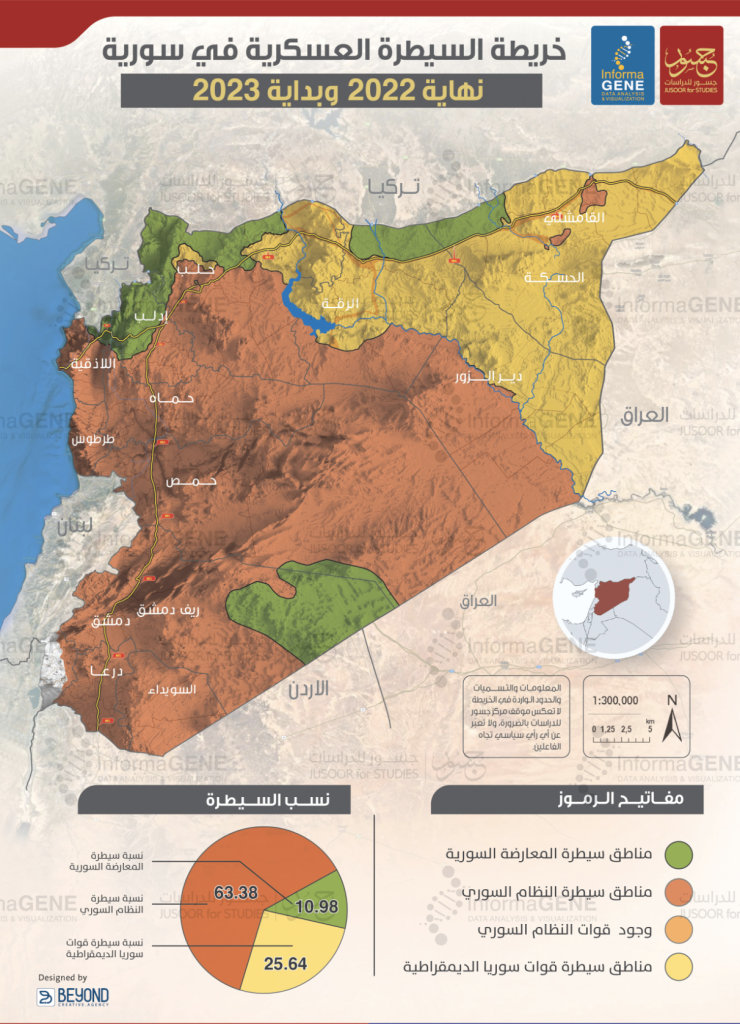
Dec 2023, The map from جسور
This reality led to the strengthening of the partnership of some Syrian-American civil institutions with some governments responsible for the security of the region in which they provide their humanitarian services, which made the discourse of those nonprofit organizations institutions to a large extent compatible with the discourse’s policy of that country, as a number of organizations involved in the so-called American Coalition for Syria[3] have become very close from the Turkish discourse.
where they see the Autonomous Administration project for the east of the Euphrates as a separatist project from Syria, and on another side, they thought the National Alliance of Syrian Opposition Forces a “political formation known for its closeness to Ankara” as a legitimate representative of the Syrian people based on its recognition by 114 countries at the Marrakesh conference[4].
Also, a number of nonprofit organizations that provide services in the northeastern regions of Syria, such as the “Syrian National Alliance” were overly loyal to the Autonomous Administration project for the east of the Euphrates, and completely opposed to the National Alliance of Syrian Opposition Forces (Which it considers to be illegitimate as a result of its acceptance of participation in the Sochi meetings, “which they see as a circumvention of Resolution 2254”, also, they signing of agreements to reduce escalation and hand over areas opposed to the Syrian regime).
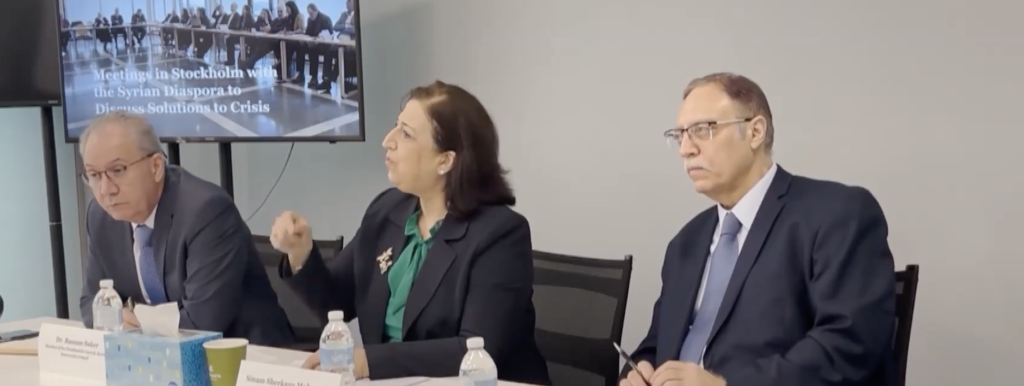
In light of this fact fraught with disputes, the Syrian Democratic Council (SDC)[5], invited a number of Syrian-American activists to a dialogue session under the title “An Initiative to Solve the Syrian Crisis”. The invitation was accepted:
- Representatives of the Syrian American consultative meeting[6]
- Rafik Hariri Center & Middle East programs, affiliated with the Atlantic Council[7]
- The American Coalition for Syria (ACS)
- Independent Syrian personalities
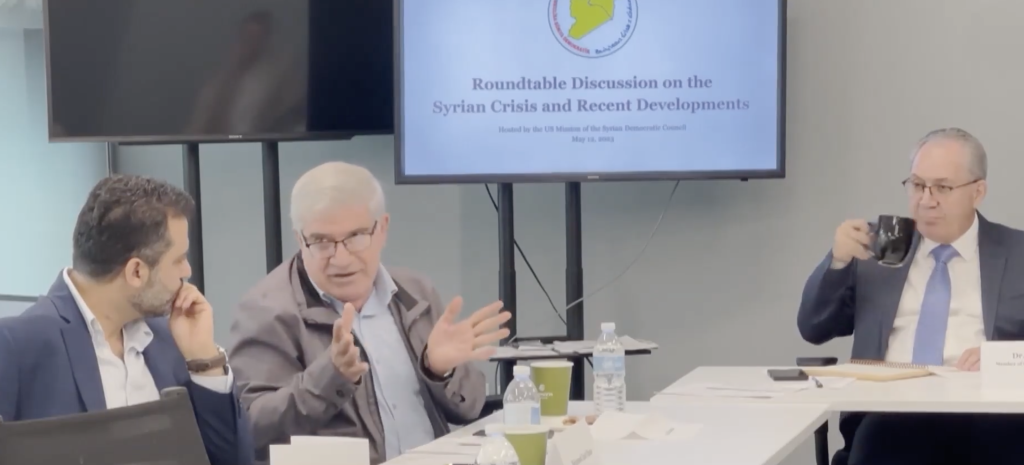
In this meeting, a dialogue paper was presented by the Syrian Democratic Council (SDC), which included a broad approach calling on all Syrians to cooperate, based on nine determinants, which we can summarize as follows:
- Syrian territorial integrity.
- The necessity of devoting citizenship and equality among the groups of the Syrian people.
- The necessity of devoting a social democratic model that enhances the status of women and preserving the environment.
- Equally distributing internal resources to the general Syrian people.
- The Autonomous Administration of Northeast Syria is ready to receive Syrian refugees in Lebanon through an international mediator.
- Combating terrorism.
- The need to defend the Syrian lands against Turkish expansion.
- Seeking to develop a peaceful democratic solution in Syria.
- Promoting dialogue and adhering to Security Council Resolution 2254.
The nine points came within 5 papers, carrying explanations in line with the directions of the Autonomous Administration of Northeast Syria, which prompted the attendees to comment on them extensively, as the representatives of the Syrian American consultative meeting expressed observations centered on the following:
- Rejection of normalization with the Syrian regime: All organizations working in the field of pressure institutions, the “lobby to support the Syrian people”, took the initiative to pass messages to members of Congress and the Senate, with the aim of rejecting any normalization with the Syrian regime, while the first item of the working paper declares the Autonomous Administration’s readiness to meet the Syrian government and dialogue with it. In the opinion of those present, the Syrian opposition should negotiate with the Syrian regime based on force, based on the following:
- The Syrian regime is internationally rejected.
- The military force of the Syrian regime’s army is weaker than the strength of the Syrian opposition and the Syrian Democratic Forces if they allied together against it.
- The need to improve the drafting of the paper, so that the terms are clear when translating, for example, in the second item, the phrase (a pluralistic, decentralized, democratic, political administrative system) was mentioned. In the opinion of those present, the method of determining the identity of the country is governed by a referendum of the Syrian people, and this matter is not possible under the presence of Assad’s dictatorial authority, or Warlord powers.
- Praising the Autonomous Administration’s direction towards embracing the Syrian refugees in Lebanon and distributing the internal wealth to the general Syrian people. Where the attendees of the Syrian American consultative meeting’s members stressed the need for the Autonomous Administration to seek to draw up a strategy to embrace the Syrian refugees from Turkey considering the growing hate speech towards them, and the reconciliation between the Turkish government and the Syrian regime, especially Turkish opposition asking to the need for the return of Syrian refugees to Syria.
- The need to dismantle any connection between the Autonomous Administration of Northeast Syria and the Kurdistan Workers’ Party (PKK), since this party is included in the sanctions lists of the US Treasury, just like the Guardians of Religion Organization and the Al-Nusra Front.
- The activists of the Syrian American consultative meeting also directed some criticism for the purpose of transferring it from the Syrian Democratic Council in Washington to the administration in Syria, as points of failure that cannot be justified, the most prominent of which are:
- The Autonomous Administration did not provide financial salaries to government employees, as they still receive their salaries from the Syrian government in Damascus, even though the Autonomous Administration is calling for a decentralized system.
- The Autonomous Administration did not provide an administrative system that makes it independent of the Syrian regime.
- The Autonomous Administration failed in managing its airspace, as it still relies on the establishment of the air force Syrian intelligence, and Russian intelligence.
- The Autonomous Administration was unable to manage oil production successfully and harmlessly to the environment, although all its proposals on paper adopt environmental protection.
- The Autonomous Administration did not take the initiative to sell Syrian oil at a reduced price to the Syrians, although it declares in its initiative the sharing of wealth.
- The Autonomous Administration failed in establishing Syrian think tanks concerned with combating terrorist groups, despite its long work with the international coalition forces in combating terrorism.

From a second angle, the head of the Rafik Hariri Center for the Middle East, Qutaiba Idlibi[8], stressed the need for the Autonomous Administration politician to refrain from describing Turkey as an “occupation” since Turkey embraces nearly 40% of the Syrians “Inside Turkey or in its areas of influence”.
From his point of view, this description reinforces the hostility to Turkey and complicates the work of the Syrian civil organizations in Turkey, and this certainly excludes any chances of networking between them and the organizations operating in the areas of the Autonomous Administration. He also suggested to the representatives of the Syrian Democratic Council the need to cancel any ideological image and slogans that link them with the Labor Party. Kurdistan.
The representative of the American Coalition for Syria (ARCS) focused on the necessity of building the Syrian person and activating the tools to protect him humanly, socially, and culturally, considering the reality of technological development based on artificial intelligence programs, which today do not accept the idea of conflicts in light of the reality of freedom of information exchange. He also focused on the fact that the dilemma in Syria is not a national or religious one, but rather a problem of the tyranny of a bloody dictatorial regime.
The dialogues were very clear and showed the possibility of finding successful work denominators. The Syrian-American nonprofit organizations close to the Turkish-backed Syrian opposition coalition had clear observations against the Turks’ normalization with the Syrian regime, and they announced this during a working dinner with the Turkish Foreign Minister on Monday. 20 January 2023[9].
Despite their strong disagreement with the Syrian Democratic Council, they adhere to the necessity of the American military presence in northeastern Syria, because this presence protects more than 4 million Syrians, which was started by Qutaiba al-Idlibi, and confirmed by Tarek Abou Ghazala[10], representative of American Coalition for Syria (ARCS).
The representatives of the Syrian American consultative meeting were unified in aiming toward the necessity of bringing the views of the Syrian Democratic Council closer, and the Syrian-American organizations supporting the Coalition.
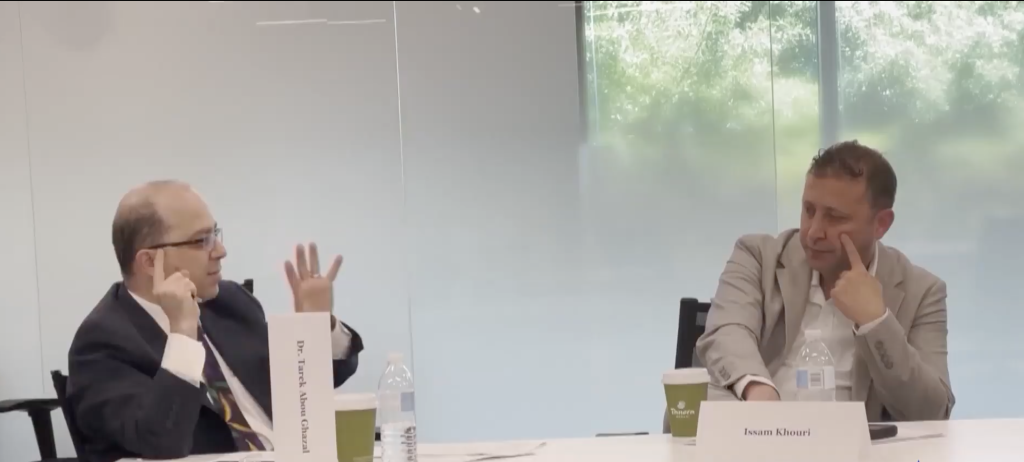
And the researcher at the Czech-Slovak Institute for Oriental Studies, Issam Khoury[11], volunteered to prepare a draft study bearing a negotiating action strategy that imposes the Syrian regime’s acceptance of Resolution 2254 based on The elements of the opposition force supporting the Syrian National Coalition and the AANES, provided that Dr. Lina Murad[12] from the consultative meeting presents it to all Syrian-American organizations and the Syrian Democratic Council in order to determine the size of the consensus, as noted by the researcher Rawan from the “Consultative Meeting” group “The need for all parties to accept the idea of the absence of full profit, because in political consensus there are always concessions, and the successful one is the one who outweighs the size of the gains over the losses, especially if the demands belonging to the weak and hopeless people in Syria.
[1] An ideology is a set of beliefs or philosophies attributed to a person or group of persons, especially those held for reasons that are not purely epistemic, in which “practical elements are as prominent as theoretical ones. in a way that relates to ideology (= a set of beliefs or principles, especially one on which a political system, party, or organization is based)
[2] Sectarian is a word to describe something having to do with smaller groups or sects. Sectarian violence, for example, would describe violence that has erupted between conflicting groups or sects. Sectarian, as a noun, is a member of a group with a particular set of interests.
[3] ACS: A network of ten American organizations specialized in Syrian affairs and active in Washington, DC
[4] Anadolu Agency. December 12, 2012
https://www.aa.com.tr/ar/archive/114-%D8%AF%D9%88%D9%84%D8%A9-%D8%AA%D8%B9%D8%AA%D8%B1%D9%81-%D8%A8%D9%80%D8%A7%D9%84%D8%A7%D8%A6%D8%AA%D9%84%D8%A7%D9%81-%D8%A7%D9%84%D9%88%D8%B7%D9%86%D9%8A-%D9%85%D9%85%D8%AB%D9%84%D8%A7%D9%8B-%D9%84%D9%84%D8%B4%D8%B9%D8%A8-%D8%A7%D9%84%D8%B3%D9%88%D8%B1%D9%8A/299198
[5] The Syrian Democratic Council is the reference and political umbrella for the Autonomous Administration of North and East Syria and the Syrian Democratic Forces, which is authorized to conduct any negotiating process. The founding conference of the Council was held in the city of Derik (northeastern Syria) on December 9th, 2015.
[6] The Syrian American consultative meeting: A Syrian-American civil formation concerned with bringing together the views of the Syrians, and launched its activity in November 2022, and calls for a secular system that brings together the Syrians, within a fair citizenship state, https://www.cesdworld.org/2022/12/15/summary-of-the-meetings-of-the-syrian-american-consultative-meeting/
[7] https://www.atlanticcouncil.org/programs/middle-east-programs/
[8] Qutaiba Idlbi is a nonresident senior fellow with the Atlantic Council’s Rafik Hariri Center and Middle East Programs where he leads the Syria portfolio.
His experience includes researching the framework of political imprisonment in Syria as the Syria expert at the International Center for Transitional Justice, analyzing economic sanctions and forced displacement as a nonresident scholar at the Middle East Institute, profiling refugee entrepreneurship in Turkey and Jordan with Building Markets, analyzing security policy in Turkey and Syria at the Global Policy Institute, and developing governance and security atmospheric reports for the US Joint Special Operations Command with Pechter Polls and the USAID Office of Transitional Initiatives with Caerus Associates. Idlbi was also cofounder and vice president of People Demand Change, where he managed and evaluated governance, civil-society strengthening, and peacebuilding programs in Syria, Yemen, and Lebanon.
He is a 2013 Leaders for Democracy fellow with the Middle East Partnership Initiative at the US Department of State and a 2016 peace exchange fellow with the Dalai Lama.
Idlbi currently serves as a board member of multiple organizations advancing accelerated education, skills training, and women empowerment across refugee communities in the Middle East. He received his bachelor’s degree in political science from Columbia University and an associate degree in finance and banking from Damascus University.
[9] During a roundtable discussion with Türkiye’s Foreign Minister Mevlut Cavusoglu and Ambassador to the U.S. Murat Mercan in New York, Global Justice hand-delivered a roadmap of 15 recommended executive steps to administer the eastern and northeastern regions in Syria, on behalf of Global Justice and Arab Democratic Alliance. A copy of this roadmap was also sent to the Syria Desk of the U.S. State Department in Washington, D.C. and the Turkish Embassy in Ankara.
[10] https://www.linkedin.com/in/tarek-abou-ghazala-29096a26/
[11] Issam Khoury is a journalist and political activist from Syria with over 20 years of experience writing and conducting research for mainstream news media in the Middle East and North Africa. He is the author of three books in Arabic and “Assad and the ME” in English and has written more than 700 reports on politics, governance, Islamic groups, human rights, culture, and the arts, and is an expert on political and social trends. and personalities. He is also the first journalist to report on the revolution, while still in Syria. Khoury is an expert on social media and has trained journalists from all over the Arab world in this matter. In 2016, he was a senior advisor to Strategy XXI Partners in New York, then in 2017 he founded the Center for Environmental and Social Development, a 501(c)(3) international human rights organization based in New York. Khoury earned a Master of Geopolitical in 2008 and was an international journalist fellow at the CUNY J-school in New York in 2015 and in 2022 he received a master’s degree from the Quantic School of Business and Technology.
[12] Lina Murad is a practicing interventional nephrologist in Washington DC. She was on the Board of the Syrian American Medical Society and has been involved in medical missions since 2012. Now she concentrates on improving medical education in NW Syria and in planning for the future healthcare of Syria through her work with the R4HSSS project with UK Kings College and through the National Health council that includes researchers and NGOs from all areas in Syria (NW, NE and regime areas)
She was a co-founder and first president of the Americans for a free Syria, the first SA lobby in the US and had testified in congress and at the Tom Lantus committee on the targeting of healthcare workers and infrastructure in Syria.
